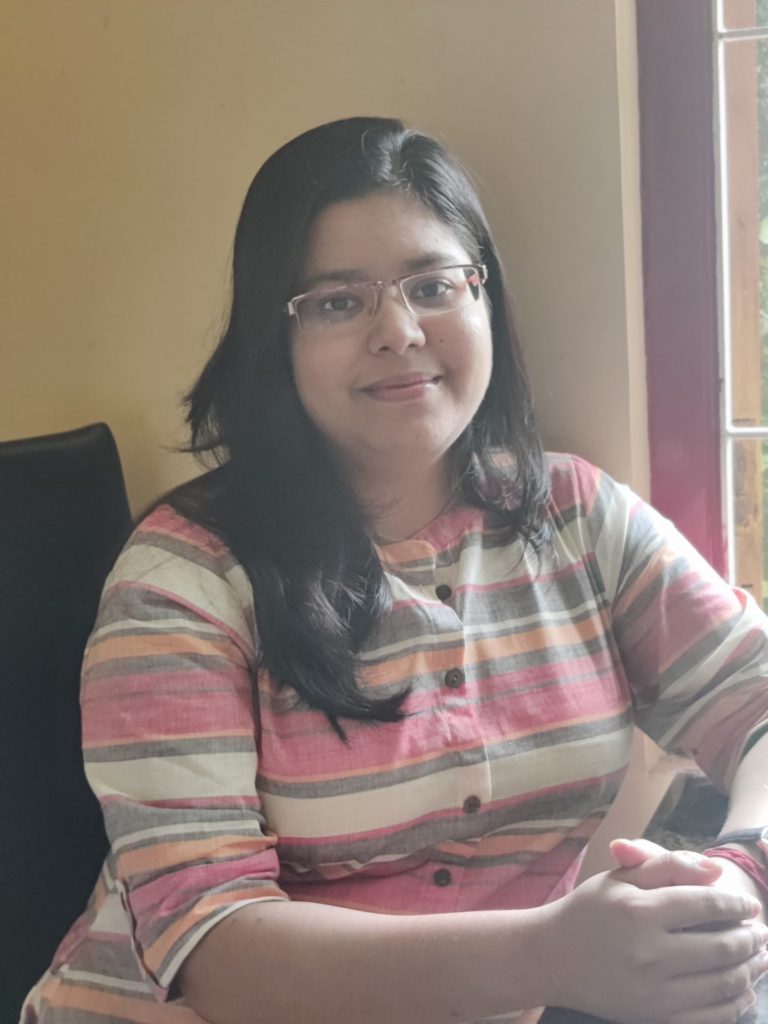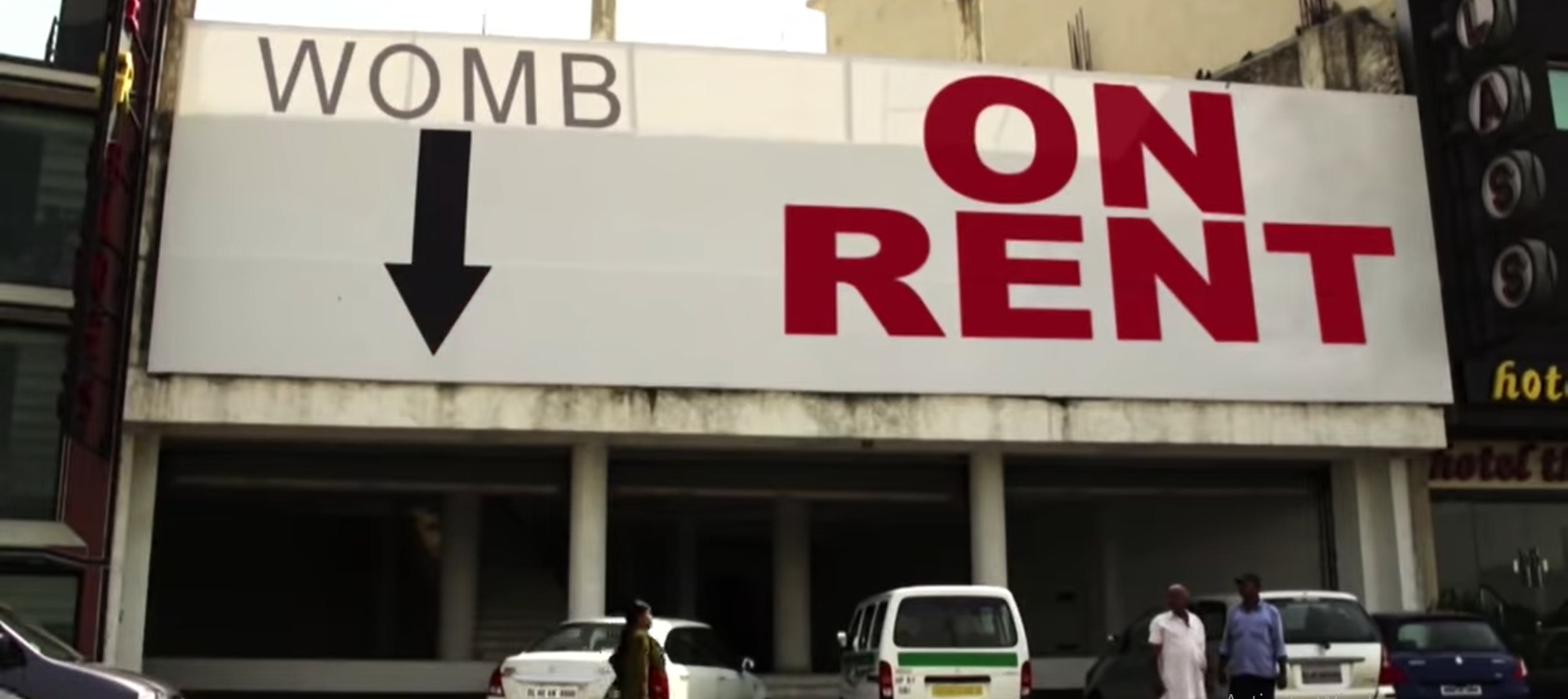image: Dutta, Ishani K. “India: Womb on Rent.” No Human Trafficking: Christus Liberat, 14 November. 2018 . Accessed 6 August 2021.
Outsourcing Womb: Surrogacy and Biocitizenship
“A business, like any other business”
Ishani K. Dutta’s Womb on Rent
In this blog piece, I would like to speculate on the medico-legal status of the women from marginalized sectors of society who for financial benefits serve as gestational surrogates for rich consumer clientele. I would like to think through the notions of citizenship, surrogacy, and disposability by analyzing the life narrative of a surrogate mother named Vimlesh as captured in Ishani K. Dutta’s documentary Womb on Rent (2013). The documentary dramatizes the unethical practices of the fertility industries and foregrounds the disposable status of surrogate mothers (I define surrogate mothers as bioengineered beings whose reproductive system is reconfigured through biotechnological interventions to design babies as scripted by the commissioning parents) and bioengineered babies who make a quick transition from valuable consumable entities to “defective products” if they fail to cope with the demands of their clients (Dutta, 2013, 0:20:32). Womb on Rent invites us to speculate on the citizenship status of abandoned disabled babies born through the process of gestational surrogacy: a bioengineered child may be conceived as a patchwork of biomatters derived from a range of individuals from diverse nationalities. Hence, the practice of ART problematizes the citizenship status in the context of babies whose commissioning parents refuse to accept them for being born with birth defects.
In India, surrogate mothers are medico-legally conceived as “collateral prosthetics” and hence, their children cannot be entitled to the citizenship rights of the birth mother (Thompson 2005, p. 145). The notion of citizenship is further problematized in the context of surrogate mothers like Vimlesh. Vimlesh (birth name-Lakshmi) is a twenty-five years old migrant who resides in one of the urban slums in Delhi with her second husband. Post her second marriage, Lakshmi is asked to inherit the name and the official identity of her husband’s deceased first wife, known as Vimlesh Devi, thus compelling her to forgo the name and identity she received from her biological parents. Vimlesh considers this to be an advantage; she explains that by forgoing her birth identity, she is able to save herself from the tiring official procedures required for citizenship identification and registration. Vimlesh’s socio-legal status presents her as a shadowy being whose presence is not archived in the government record. Officially Lakshmi is not recognized as a person; her presence gets legal significance through the identification proof of Vimlesh Devi. As such, she represents the community of the uneducated and unrepresented surrogate mothers of India who are strategically exploited by the medical agencies because of their ambiguous socio-legal status and ignorance. Vimlesh, like most migrants in India, has not received a proper education that might help her understand the complexities of the medico-legal documents. Surrogates like her remain at the mercy of the medical agents who exploit them biologically and emotionally for financial benefits. Womb on Rent asks how is it possible to protect the rights and entitlement of a surrogate mother in a country like India where no definite laws are formed for regulating surrogacy industries. In addition to this, the citizenship status of a woman like Vimlesh is further problematized by the patriarchal norms that deny a woman autonomy to gain socio-cultural, legal, and financial agency.
I want to argue that narratives of biocitizenship have subsequently produced a race of non-agentic bioengineered lives whose shared biological relatedness is systematically effaced to cater to the demands of rich and empowered citizens. The film depicts that, to Vimlesh, the entire baby-making process seems to be a liberating and empowering phenomenon that enables financial benefits without violating the sanctity of her marriage. However, gradually the bleak and inhuman feature of the surrogacy industry is revealed to her. Vimlesh recalls how in the orientation programme the medical practitioners and trainers state that the underlying concept of surrogacy is “all about renting out your womb” (0:12:10). An explicit connection is drawn between “renting an apartment and renting womb for nine months on contract” (0:12:05). Vimlesh gradually realizes her disposable and peripheral status in the baby-making industry when she reaches the advanced stage of her pregnancy. She perceives herself as a non-agentic being whose contribution is neither acknowledged by the medical industry, nor by her partner for whose financial improvement she had decided to enrol in the surrogacy process.
Unfortunately, Vimlesh represents a section of women who are thrice removed from the concept of empowerment. Her journey as a surrogate is haunted by a series of anxiety and uncertainty. In India, surrogate mothers embark upon a roller coaster of emotions at the heart of an economized medical procedure that continues to be an irreconcilable world of medical mysteries and uncertainty. It is clear that focusing on the socio-legal status of surrogate mothers enables us to rethink the evolving notions of biocitizenship, with a renewed attention to the politics of biomedical disposability that is extended to the women’s belonging to the peripheries of society.
Further Reading
- Dutta, Ishani K. 2013. Womb on Rent. Carrot Films Delhi. https://www.womensvoicesnow.org/
- Desai, Kishwar. 2012. Origins of Love. London and New York: Simon and Schuster.
- Happe, Kelly E, Jenell Johnson, and Marina Levina (Eds). 2018. Biocitizenship: The Politics of Bodies, Governance, and Power. New York: New York University Press.
- Kennedy, Greg. 2007. An Ontology of Trash: The Disposable and Its Problematic Nature. New York: State University of New York.
- Karmakar, Manali and Avishek Parui. 2019. “These were made-to-order-babies”. Reterritorialized Kinship, Neoliberal Eugenics, and ART in Kishwar Desai’s Origins of Love. Medical Humanities 46 (3): 323-332.
- Malladi, Amulya. 2016. A House for Happy Mothers. United States: Lake Union Publishing.
- Rose, Nikolas and Carlos Novas. 2003. “Biological Citizenship.” In Global Assemblages, 1-40. Edited by Aihwa Ong and Stephen Collier. United Kingdom: Blackwell Publishing.
- Thompson, Charis. 2005. Making Parents: The Ontological Choreography of Reproductive Technologies. Cambridge and Massachusetts: The MIT Press.
About the author

Manali Karmakar
@KarmakarManali
Manali Karmakar is Assistant Professor in English at Vellore Institute of Technology, Chennai. She has earned her Ph.D. from IIT Guwahati and has specialized in the area of Medical Humanities (Literary Studies, Medicine, Biotechnology). Her research interests include literature and medicine, posthumanism, and mental health and disability studies. Her work has appeared in Journal of Medical Humanities (Springer), Literature and Medicine (John Hopkins University Press), Medical Humanities (British Medical Journal), Cogent: Arts and Humanities (Taylor and Francis) among other places.

